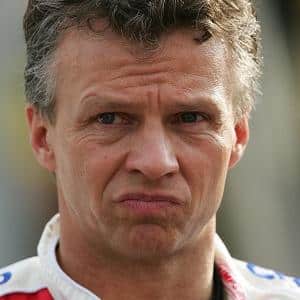Jan Lammers: The Motor Sport Interview
Jaguar 1988 Le Mans winner Jan Lammers on early F1 frustration, his enduro escapades and the difficulties of racing a BTCC Volvo estate
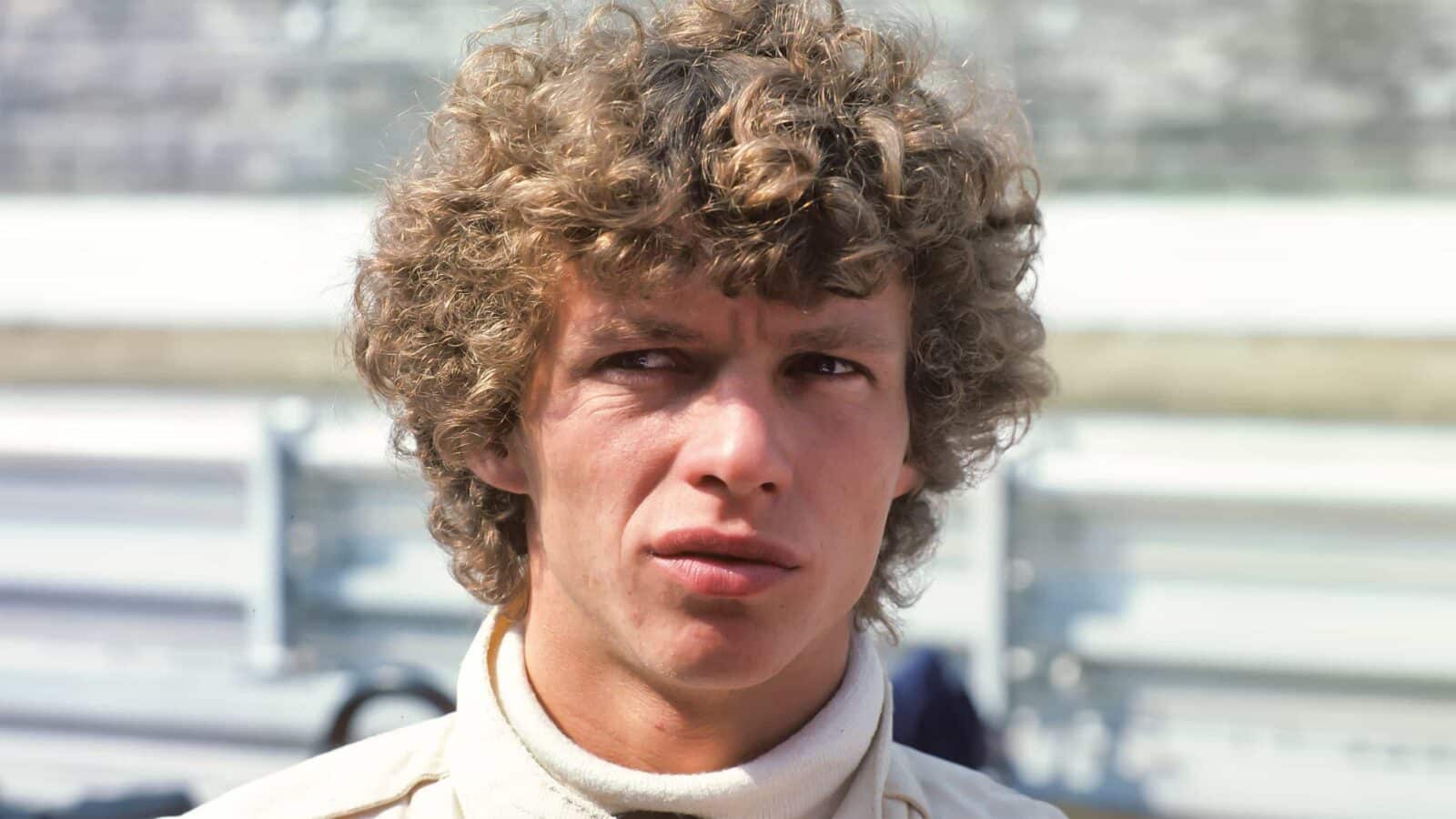
McKlein
Born in the seaside town of Zandvoort, not far from the famous circuit, Jan Lammers has done so much to raise the profile of Dutch racing drivers, long before the arrival of Max Verstappen. This most versatile of racers found success in an unusually wide range of categories, a long and eclectic career taking him all the way to Formula 1 with Shadow, ATS, Ensign, Theodore and March, and victory for Jaguar at Le Mans in 1988.
At just 16 he won the Dutch Touring Car Championship, the youngest ever champion, and won it again in ’83 and ’84. He won the European Formula 3 title in 1978 before going straight to F1 with Shadow and four years on the grand prix grid. Jan founded the Racing for Holland team in 2001, winning the FIA Sportscar Championship in both 2002 and 2003 and helping Dutch drivers make their mark in the sport. He has been an influential figurehead and ambassador for the return of the Dutch Grand Prix to Zandvoort in 2021 and is now coaching and advising his teenage son René, already a karting champion, through a season of Spanish Formula 4.
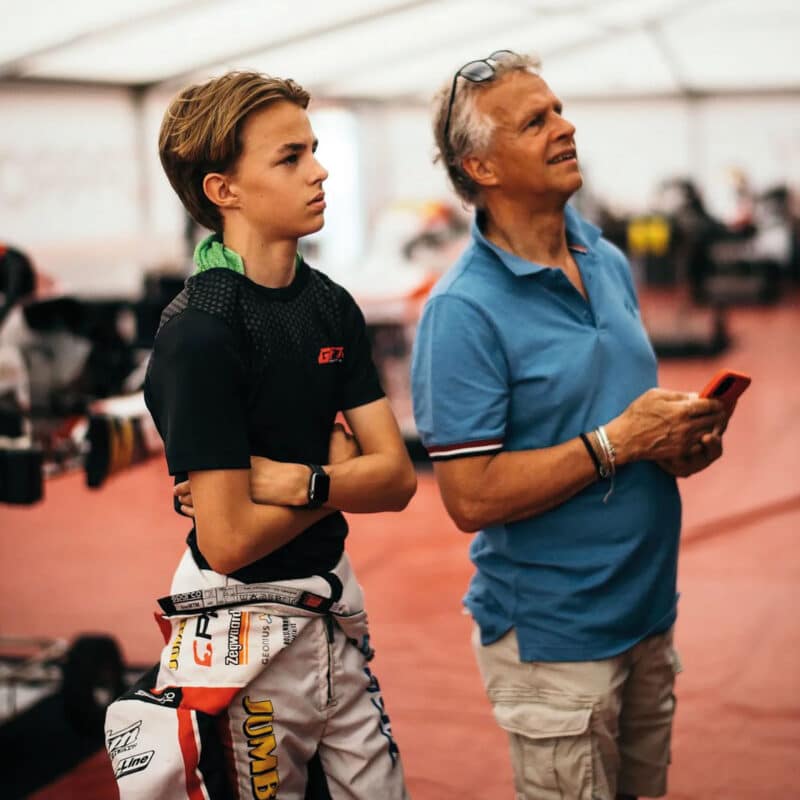
René picks up crucial tips from Dad
Motor Sport: Starting in the present tell us about how you are helping René through the lower formulae. What are his ambitions, and your strategy, for taking another Lammers to the top level?
JL: The plan is to guide him all the way to the top, so Formula 1 is the ultimate goal, but the landscape has changed enormously over the years. Everything now is more of a system, more protocols, so the route from karting, to F4, to F3 and F2 is pretty much the standard plan. There are so many teams now, the bigger ones with six drivers, and they offer the opportunity for youngsters to learn the skills that are needed as they progress from karting, learning about tyres, race starts, push laps, cool-down laps, all this. In the bigger teams all the data is shared so it’s much harder for a driver to make a difference. So it’s more difficult now for someone to stand out.
Can you be properly objective? There are so many talented youngsters out there trying to make their way through to one of only 20 seats in F1?
“I’d raced against Prost and Mansell when I won the F3 title“
JL: It’s OK because I am a fan of objectivity, so for me I need to judge by results. I can’t say my son is the best if he’s not winning races. There are no excuses. If you don’t win, you lose so I am hard on him, and he has to win in one formula before he can move to the next one. He’s with a Dutch team, MP Motorsport, and they have all the ingredients needed for him to win. If there’s ever something we don’t like, we will talk about it and they will make changes. Top 10 is not good enough, you have to be winning, and for that you need to have a positive mindset, not an obsession, just a very clear goal. It’s my duty to place René in an environment where he can be successful. That’s part of what a coach, or parent, has to be doing.
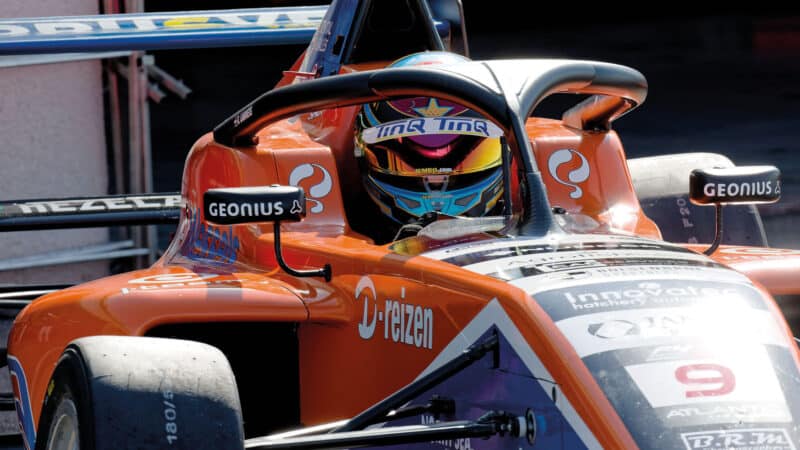
Lammers’ son René is racing in this season’s F4 Spanish Championship.
Alamy
Looking back on your meteoric rise to F1 do you think it was just too soon, that you were too young to make the best of it?
JL: I wouldn’t have done anything different. I wasn’t any smarter back then. I had the talent, but maybe not the intelligence. All the mistakes I made, I would do them all again, and hindsight is a wonderful thing. People say there is too much focus on Formula 1 but you cannot have a wide-angle focus. The only way is to aim for the top, and to achieve that goal you must have a specific target. If you climb Mount Everest you go for the summit. If you play darts you aim for the bullseye. There can be no distractions, no excuses along the way.
So I came away from Formula 1 with a lot of frustration. I’d raced against people like Alain Prost and Nigel Mansell when I won the F3 title and I thought, given the right team, I could have done a lot more. That’s why I went back to Formula 1 with March in 1992. I didn’t want to look back in the future and wish I had taken that opportunity to do two races at the end of that season and I still felt I had the ability to achieve more than I did.
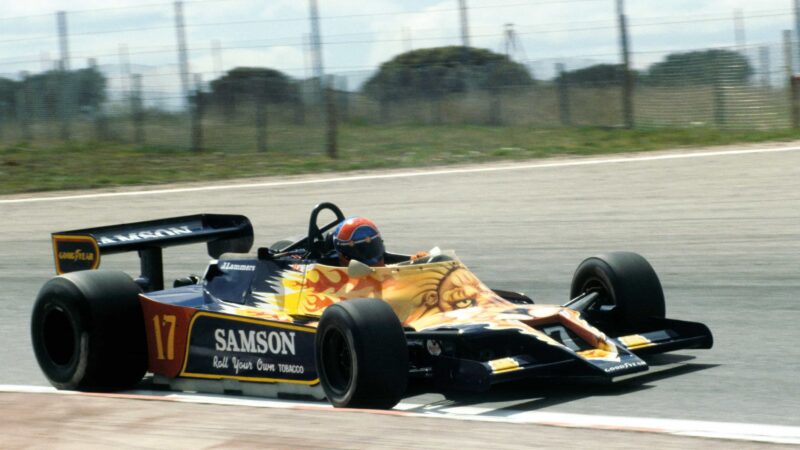
Lammers’ first full Formula 1 season was 1979 with Shadow – here at Jarama racing from 24th (last) on the grid to finish 12th
Getty Images
After your time at Theodore you got involved with Richard Lloyd’s sports car team, taking on the challenge of beating the Porsche factory cars.
JL: Yes, it was nice, but in the beginning I was a little too wound up. I was too focused on my own performance, my ego clashing with Jonathan Palmer, an attitude I still had from Formula 1. It was a bit tense but we’re friends now and once I calmed down we survived that and I understood the team game. In 1984 Jonathan and I won the Brands Hatch 1000Kms with Richard’s Porsche 956, the team’s first world championship victory and we’d beaten the Joest Porsche by three laps. That was great.
Then, going to Le Mans was such an amazing experience. It’s a phenomenal circuit, the speeds were so high, the Porsche was a rocket on the straight, although maybe we didn’t realise how dangerous it was back then. Of course winning in ’88 was absolutely a wonderful moment, beating the works Porsche in the Jaguar XJR-9, the first time they’d been beaten in seven years at Le Mans. Now the race is a sprint and all the safety cars can disrupt the race at any time.
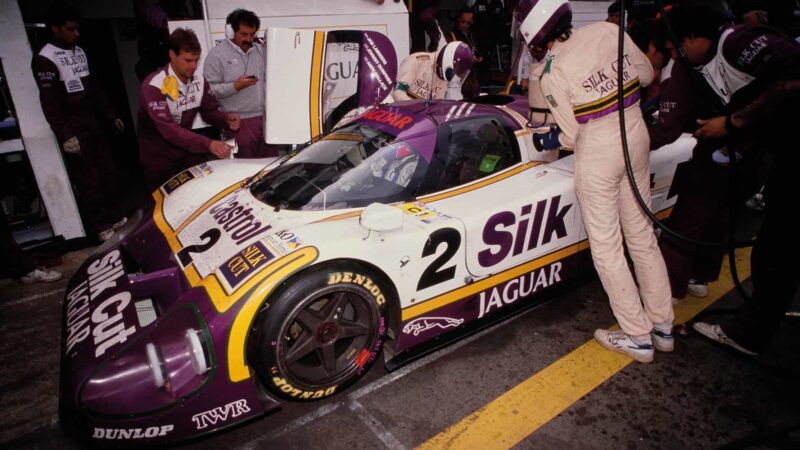
Refuelling at Le Mans 1988
Getty Images
For a time at Walkinshaw with the Jaguars you were racing at the top of your game, finishing runner-up in the World Sportscar Championship in 1987 sharing the XJR-8 with John Watson. Do you look back on that as a high point?
JL: Those cars were state-of-the-art at the time, a lot of torque, and a high centre of gravity at the back with a heavy engine which suited me because I’d grown up with rear engines that affect how you drive the car. It was a fantastic team, Tom Walkinshaw, Roger Silman and Tony Southgate. They didn’t mess about. They told you straight up what it was all about, and I needed that as a person, so I had a lot of respect for how they ran the team. If they thought I could get the job done, I knew I could perform at my best. They had faith in me. That really boosted my confidence, and Southgate’s design produced a very good car. Racing is all in the head. OK you need the talent, but it’s attitude over circumstance.
Mental preparation is vital, and you need to keep fit for those long stints. You must always refuse to accept defeat. I mean we’d won Le Mans with a broken gearbox back in ’88. We just focused on the positives, believed we could beat the works Porsches. Long-distance racing is a team game. You have a plan, you know what you have to do and you stick to the plan, the lap times, the revs, all of that, for as long as you can.
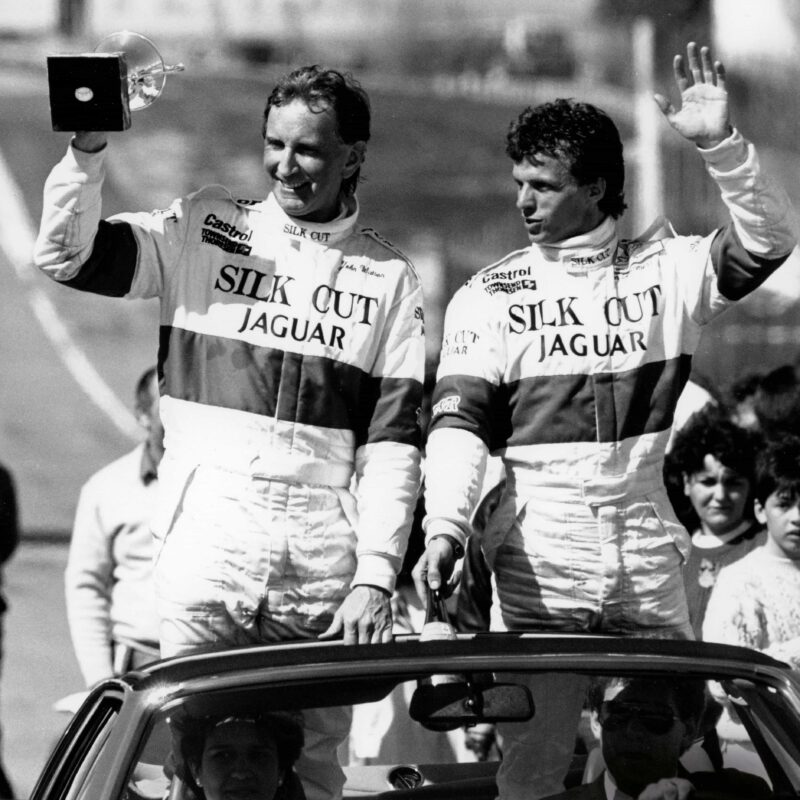
Jag boys John Watson and Lammers with trophy after winning the opening round of the 1987 World Sportscar Championship at Jarama
Getty Images
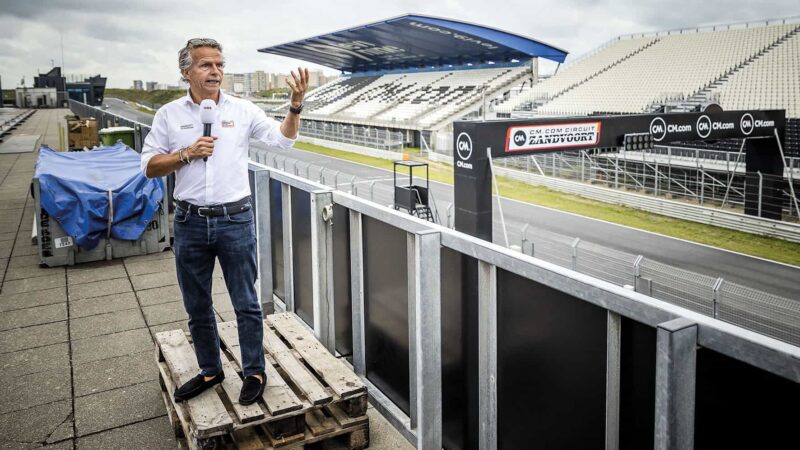
speaking to the press at Zandvoort in 2021 before the return of the Dutch GP
Getty Images
In ’94 you went back to Walkinshaw’s team, this time to race a Volvo 850 estate car in the British Touring Car Championship. A surprising move to say the least.
JL: Yes, well, I guess so, but Tom told me he was doing this, I was to be Rickard Rydell’s team-mate, but I wasn’t immediately aware that it was the estate car. I trusted Tom and I agreed. I admit, however, that when I drove out of the pitlane at Snetterton, put it in third gear, my first thought was, “Thank God I’ve only signed up for one year.” It was a bit of a reality shock for me and I didn’t make the best of it. I was attacking the corners, pushing too much, landing on the front wheels, and I was braking like I was on a kart.
“Racing a Volvo estate, maybe it was some form of masochism“
Rydell was good, smarter at it than me, because with front-wheel drive you don’t drive it like I was doing, braking late, trying to rotate the car. You have to focus on the exit of the corners, be more relaxed on the throttle. It’s a different discipline, and if you get it right it will also help you drive a rear-wheel car. So, yeah, maybe it was some form of masochism.
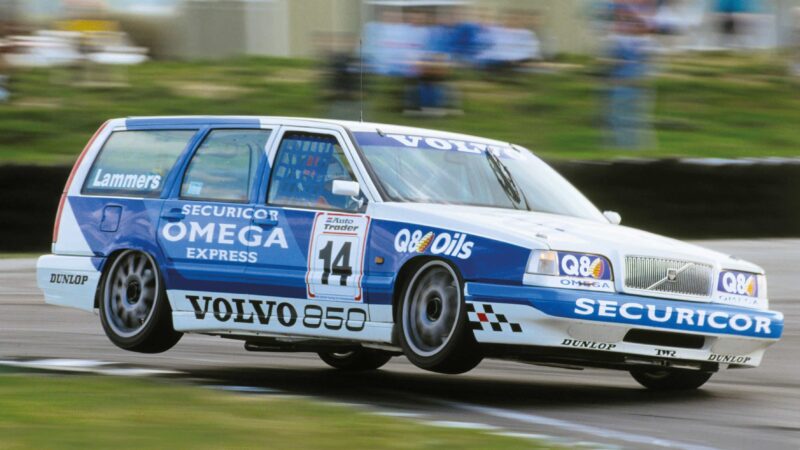
Attacking the corner” in BTCC, 1994
Volvo
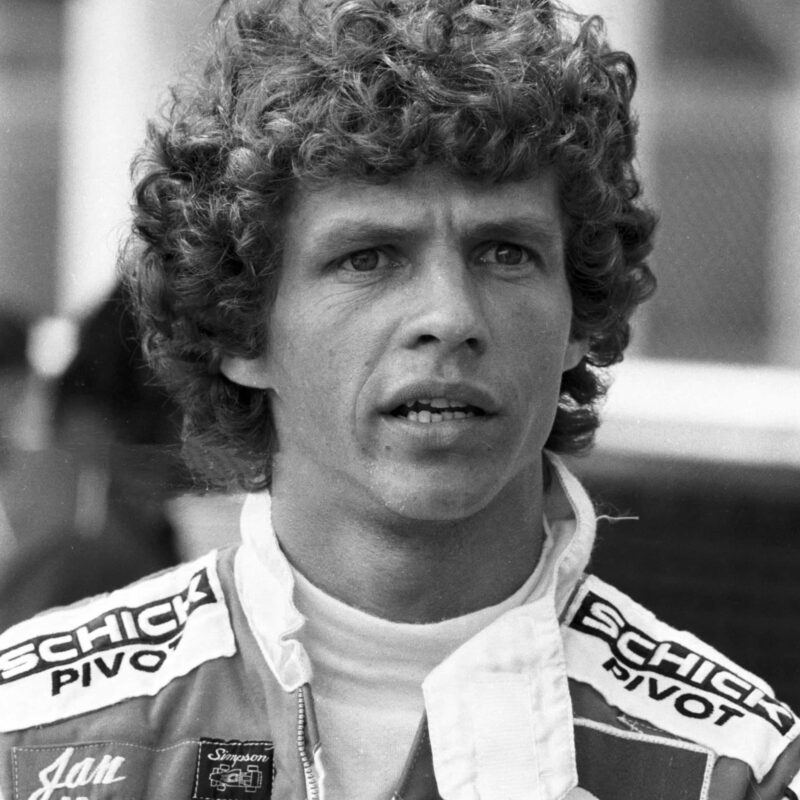
Disappointment for the Theodore driver at Monaco, 1982 – DNQ
Getty Images
Let’s look at what you’ve done for motor sport in your country where you’ve worked hard and effectively to promote not only the sport but also the return of a Formula 1 grand prix at Zandvoort.
JL: Back in 2005, when I ran the Racing for Holland team in A1GP, it was up to me to promote the series at home and for the race at Zandvoort we had 100,000 spectators over three days, but since then the sport has changed enormously in Holland. There is a whole new fanbase, especially since Max Verstappen arrived in Formula 1, and that’s also when social media moved to another level. A lot of people took an interest in Formula 1, and motor sport in general, when Max started winning but they didn’t have any in-depth knowledge of motor racing so 80% of the fans were ‘late adapters’ and 20% the real hard-core enthusiasts who knew about the likes of Andretti, Hunt, Fittipaldi and Lauda. Max woke up a whole new audience and that also coincided with Bernie [Ecclestone] selling out to Liberty Media who brought the sport closer to a bigger audience via the social platforms.
So all this meant that in Holland we now had a much bigger fanbase that had become enthusiastic about Max, about Formula 1 and the sport. If Max retired from a race all the TVs would be switched off. He’s been a kind of Trojan horse bringing attention to drivers like Lando Norris and Charles Leclerc and, of course, there was also Netflix and Drive to Survive which was another element of the enormous increase in enthusiasm for the sport.
There came a point in Holland when motor racing became more popular than soccer but now it’s settled down a bit and when Max decides to stop there will still be this fanbase because they’ve got to know so much more about Formula 1.
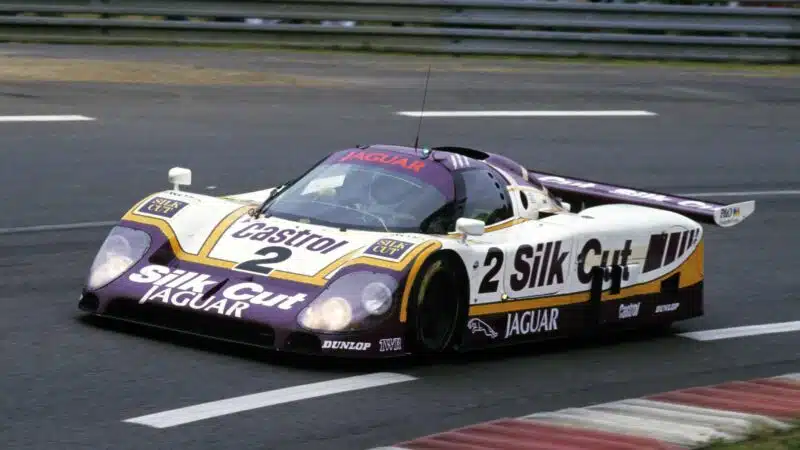
Lammers nursed home his XJR-9 LM at La Sarthe in ’88, which had a broken gearbox.
McKlein
What’s your view of the way Max Verstappen goes about his racing? His overwhelming desire to win has attracted some criticism this season – especially after punching his steering wheel.
JL: Well, Max Verstappen simply does what it takes, you know, he’s a bit like Erling Haaland or Zlatan Ibrahimović, those great footballers. If you stand next to them in the elevator they scare the shit out of people, and Max can sometimes be quite intimidating. He just wants to win.
“I was fast from the early days and I raced with some great drivers“
Any team wants that in a driver and we want these guys to fight. We don’t want boring races, and incidents happen when drivers are fighting wheel-to-wheel on the track for the win. The fans need to learn that if their favourite driver loses out in a fight it doesn’t mean they have to hate the other guy. I mean it’s still a sport, and having known Max from when he was a little kid, I can tell you he’s a wonderful guy who is very straight, and he stands up for his friends and the people who work with him.
Yes, he’s a terrible loser, but that’s true of the great racing champions, and he calms down pretty quickly.
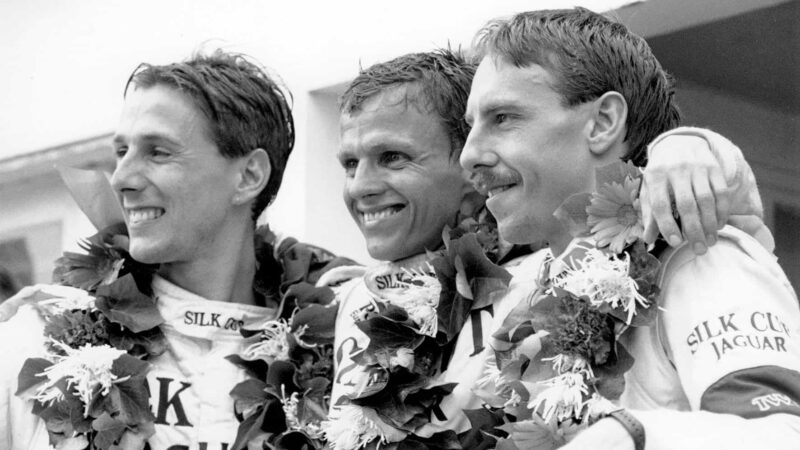
Johnny Dumfries, Lammers and Andy Wallace, Le Mans 24 Hours 1988
Getty Images
Is it easier, or even harder, to make it all the way to the highest level these days? There are so many youngsters with talent jostling for a place on the grid.
JL: It’s easier, and therefore it’s harder, because there are so many structures, and academies, where you can show your ability. The chances of a boy who’s karting making it to the top are slim, it’s a numbers game, and today there are also girls being scouted by teams and for them to succeed we need to see them beating the boys. I’ll be the first to celebrate if a woman wins an F1 race in the future and schemes like the F1 Academy are gradually making this more possible. I think Formula 1 is more accessible now for younger drivers but at the same time the expiry date of the older drivers has been extended and so drivers like Fernando Alonso can race for a lot longer. Look at Andrea Kimi Antonelli in Formula 2. It’s not easy to win, it’s very competitive, there are many talented drivers, but he is on his way to F1. Maybe in a few years’ time there will be a big change-around, when the older ones retire, and some of these youngsters, who merit and deserve their chance, will achieve their goals.
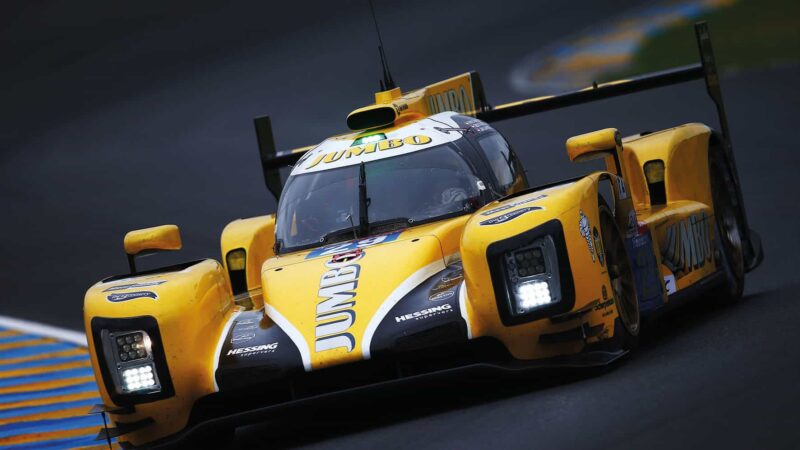
Final Le Mans, 2018
Getty Images
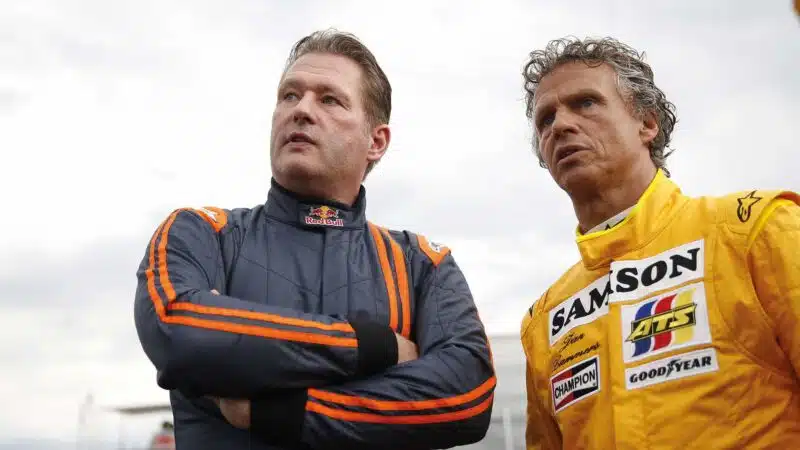
With fellow countryman Jos Verstappen, 2016
Getty Images
You raced for four F1 teams, completed 95 races for Jaguar, and won Le Mans, Daytona and Sebring. How do you assess a career that spanned 40 years in so many different cars and categories?
JL: I have absolutely no regrets. I was fast, right from the early days, and I raced with some great drivers. I have seen so many motor racing people who have regrets because they didn’t achieve their ambitions they had when they started but I’ve had a wonderful life doing what I love to do and that’s race cars. I’m very happy with that. Now it’s my job to help my son make the best of his talent.
